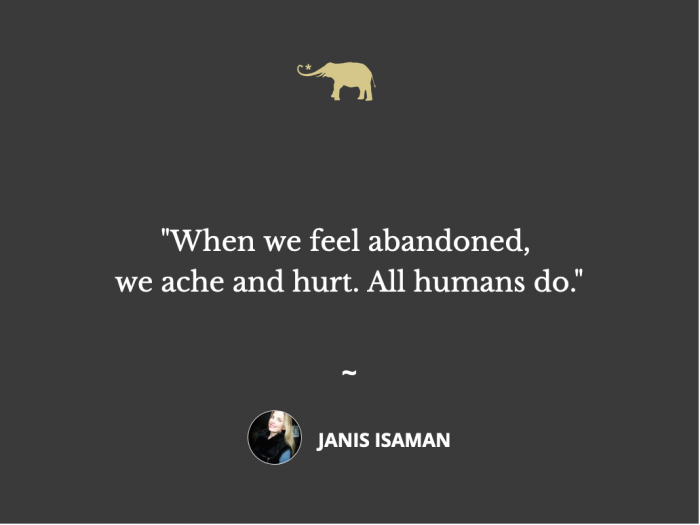“Don’t give your power away. Don’t let it bother you. Men need space.”
This was my girlfriend’s well-meaning advice.
I could feel a burning in my chest and a pit in my stomach as my anxiety clouded my thoughts. Panicked, I could sense my thoughts churning faster and hear the higher pitch and tone of my voice.
“No, no, no, I don’t actually feel that anymore. I’m fine. I’m good,” I uttered. I had called her in crisis after another date didn’t work out.
As I tried not to feel what I truly felt, shutting off and severing my emotions, I had to override my own body’s signals and convince my brain they weren’t real—in order to live with myself.
This disconnect from ourselves is dating trauma.
Most long-time daters are peer coached to create an open space on dates: present our hearts, create a nurturing environment, exchange flirtatious touches, and replicate this energy date after date.
But what becomes of us when things crumble and fall apart after the second date or the second month?
When we are randomly unmatched on a dating site for no reason? When our date ghosts and the connection just stops?
When each of these things happens a dozen times, 100 times, or 1000 times?
When we look for support from friends or within ourselves, we are to have no emotion around our losses.
We internalize platitudes:
“Don’t let it bother you.” “Don’t get upset by this.” “It means nothing.”
We try to shut it out and feel nothing rather than processing and experiencing.
And support is low—it is not socially acceptable to express heart-related angst about mini relationships. If the answer to “how long were you together?” isn’t culturally deemed “long enough,” it’s invalidated and “just not a big deal.”
Instead, our remedy is to “meet someone else,” which means dancing it off and never mentioning it again.
Yet, inside our bodies, it doesn’t work that way when we feel loss—over and over again—and lack support, lack feeling, lack an empathetic abiding witness, or lack self-compassion.
This failure to give space to: “this is painful,” “this feels like rejection,” “this feels awful” means we not only abandon our authenticity but also that we experience trauma.
The tiny interactions of serial dating transmute themselves up into pain and disconnection, and we might find ourselves increasingly angry or panic-filled because we haven’t metabolized the previous losses.
And then we think something is wrong with us.
Dating trauma is not about what happened on one date or with one person; it’s about the denial of authenticity and connection within ourselves, which hinders connection with others.
Dating trauma is currently a culturally unacknowledged phenomenon of pain—one that needs to be seen, heard, and validated.
Nothing is wrong with us.
These losses deeply impact our nervous system.
Our bodies have a biological response to loss: the pain of rejection is processed by the same pain receptors that advise us of physical pain.
We have a strong tribal biological pull that means getting rejected feels painful. When we feel abandoned, we ache and hurt. All humans do.
Although dating advice says to our head, “Don’t get ahead of it,” or, “Stay present,” on dates, our body and biology are saying, “We’re connecting.”
Our nervous system says, “We’re connecting.”
And our hormonal signals say, “We’re connecting.”
Humans thrive on this connection.
So when it is pulled away and removed, sometimes without warning and almost always without validation, repeatedly, we develop trauma responses.
We may hit a wall of overwhelm, and delete the app or take a dating hiatus, finding it hard to trust others.
Our feelings of rejection, sadness, and grief are trapped inside, and we feel lonely and minimized, without an emotional outlet to feel safe and process.
We may find it really hard to keep that positive attitude of “it only takes one.”
We feel disconnected from our truths.
We may date more (and faster) to minimize the connection and try rotational dating, which buffers the loss and encourages disconnection.
We may lash out and call our dates names on Facebook groups and blame them for our pain.
We might feel helpless and hopeless and turn to coping mechanisms, including over-eating, over-drinking, or over-shopping.
We might not know how to get past two dates, or we might stop speaking vulnerably about what we want.
Trauma lives in our brain as a heightened state. We need to metabolize our pain.
We need to have personal practices that build emotional health, emotional safety, and bodily awareness so that we can identify sensations in our body:
1. We can recognize that nurturing and caring skills are biologically inherent but also require practice, and we can build a self-awareness and self-compassion practice that we do every day. This strengthens our ability to access this skill.
2. We can sit with our experiences, acknowledge our pain, identify where we feel sensations in our body, and link them back to what we would tell a friend in the same scenario. This removes the internalized sense of feeling flawed.
3. We can surround ourselves with people who have a focus on self-growth and find at least one friend who is focused on witnessing our experience.
4. We need to be seen and attuned to. We need to be around others who are undertaking the same process. We need to find others who can hold us. It’s really important to have somebody else in the world doing so.
5. We need to establish a self-compassion practice, where we say, “This is really painful, and really hard” to ourselves. We can learn how to do that for ourselves and practice it forever.
6. We need to be truly vulnerable on dates, telling our date if we want to see them again or that we want to text them. Authenticity is a practice, not an idea.
7. We need to stop rotational dating, padding our losses with other people, and we need to focus instead on feeling—expressing our feelings in the present.
8. We need to connect to our bodies. When we’re behaving with authenticity, our nervous system feels calm. We need a body practice such as yin yoga—every day—to develop a blueprint in our awareness about what that feels like. And when we jump outside of that, in a dating context, we know we are doing something that’s potentially traumatizing.
9. We need to choose a partner who’s going to help us recover from dating trauma, as opposed to someone who contributes to us feeling triggered all the time.
10. We need to create a community. Because if we’re trying to foster connection, mirroring is an instrumental skill. We can surround ourselves with other people who are doing the work of building emotional safety skills, self-regulation skills, co-regulation skills, and self-awareness skills so that we know what safe people feel like. These are the kind of people we want to date and have the capacity to become our gold standards.
We need to feel and acknowledge the experience in our bodies and take steps to reconnect to ourselves with authenticity.
Dating trauma can feel like we are drowning, but these tips can help us reconnect and breathe again.


 Share on bsky
Share on bsky





Read 49 comments and reply